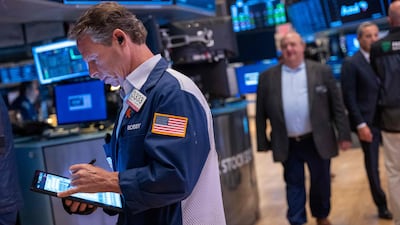A key measure of inflation closely monitored by the US Federal Reserve fell to a two-year low last month, boosting hopes that the central bank could be done with raising interest rates.
The Personal Consumption Expenditures (PCE) Price Index increased 0.4 per cent in August, data released by the Labour Department on Friday showed. PCE inflation rose 3.5 per cent on an annual basis, slightly higher than 3.4 per cent in July.
Last month's increase reflected higher petrol costs, which have steadily climbed in recent months. As of Friday, US drivers were paying $3.83 a gallon at the pump, according to motor group AAA.
An underlying inflation metric, however, will be welcome news for the Fed.
Core PCE inflation – which excludes food and energy – increased 0.1 per cent. It slowed to 3.9 per cent on an annual basis in August from 4.3 per cent the month before, a two-year low.
Federal Reserve chairman Jerome Powell has said the central bank needs more evidence that inflation is sustainably moving towards its long-term 2 per cent goal before it decides on its next decision on interest rates.
"We want to see convincing evidence, really, that we have reached the appropriate level. We need to see more progress before we'll be willing to reach that conclusion," he said after the Fed paused raising interest rates last week.
The Fed left interest rates unchanged between 5.25 per cent and 5.5 per cent at the conclusion of its September 19-20 meeting.
A majority of central bank officials are forecasting one more interest rate increase for this year.
Consumer spending, which accounts for nearly 70 per cent of the US economy, increased 0.4 per cent last month down from a revised 0.9 per cent in July.
The latest data – strong spending and moderating inflation – will also bolster hopes that the Fed can slow the economy without driving it into a recession. Mr Powell had cautioned against optimism over a soft landing, pointing to numerous external factors such as rising oil prices and the resumption of student loan payments.
A separate report earlier this week showed that the US economy grew at a 2.1 per cent clip last quarter, unrevised from a previous estimate.


